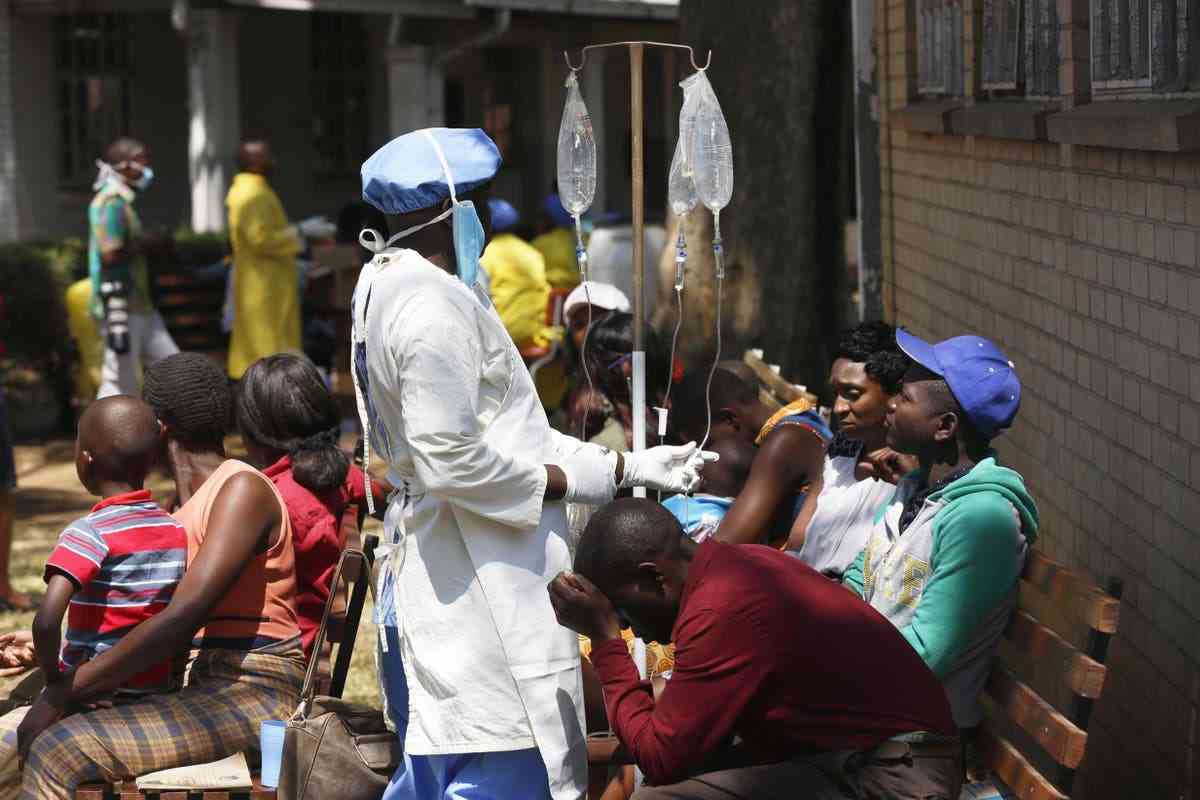SOME of Zimbabwe’s institutions of higher learning are experiencing a cholera outbreak sweeping across the country, with some students now being told to bring water from home as education authorities fail to supply the commodity. Health authorities ordered the closure of one of the country’s biggest teachers colleges after more than 500 people suffered from diarrhoea.
By Sunday 19 November, Zimbabwe had recorded about 8,000 suspected cholera cases, 51 de@ths and another 152 suspected cholera de@ths, according to a situational report from the health authorities.
According to the World Health Organisation, cholera, which is an acute diarrhoeal infection, is caused by ingestion of food or water contaminated with the bacterium Vibrio cholerae and “remains a global threat to public health and an indicator of inequity and lack of social development”.
In Zimbabwe’s towns and cities, local authorities are failing to supply institutions such as hospitals and universities with adequate water due to ageing infrastructure and a lack of resources due to the biting economic crisis. Rampant unemployment has seen streets in many towns being turned into illegal markets where vendors sell food under unhygienic conditions, fuelling conditions in which diseases can develop.
Mkoba Teachers College
Dr Mary Muchekeza, the Midlands provincial medical director, said in a statement on 13 November that about 500 people at Mkoba Teachers College, the majority of them students and some lecturers, have been affected by diarrhoea, and the institution had to be closed for two weeks.
“We recommend the temporary closure of the institution and postponement of all scheduled events for 14 days until all recommendations made to the institution have been thoroughly met,” Muchekeza said.
Education authorities at the institution, however, defied the directive and have now directed students to bring their own water to college from home.
In an interview, Doreen Sibanda, a student at Mkoba Teachers College, said: “We bring our own water from home. They are small bottles – 500ml to 1 litre. There is water for toilets but, for drinking, it is said to be unsafe.”
Sibanda, who is also the Zimbabwe National Students Union’s (ZINASU) outgoing Midlands provincial vice-chairperson, said the college was not closed as was recommended, and speculated that the reason may be that examinations are around the corner at the institution. She said water bowsers now bring water to the college from Midlands State University.
Both Mkoba Teachers College and Midlands State University are located in the city of Gweru.
Great Zimbabwe University
Boitumelo Tlou, the Great Zimbabwe University Students Representative Council treasurer, told University World News that the institution’s Mucheke campus has gone without water for five days. The university is located in the city of Masvingo.
“There is a water crisis at the Great Zimbabwe University. At Mucheke campus, students have not had water for the past week … Also, in the surrounding suburbs, there is a water crisis. They have gone for something like a week without water,” she said.
“Students are afraid of cholera because the campus is now dirty and, a few weeks back, there were cholera cases recorded in Gutu [in the same province]. This shows our lives are at risk as cholera can hit us at any time.”
A wake-up call for the authorities?
David Dzatsunga, president of the College Lecturers Association of Zimbabwe, told University World News that there is a risk of cholera spreading through campuses as happened with COVID-19.
“The Mkoba outbreak is a wake-up call to the authorities to prioritise educational institutions in terms of water and sanitation provisioning as they are always crowded and, therefore, prime sources for the spread of epidemic diseases like cholera. We also had similar experiences with COVID-19,” he noted.
Emmanuel Sitima, the president of ZINASU, said there is always a malfunctioning sewer system, particularly at the University of Zimbabwe, which enhances the cholera threat.
He criticised the decision not to follow the advice of health authorities in the face of a public health threat, as in the case of Mkoba Teachers College.
“A recommendation of the closure of the institution was given to the college, but that recommendation did not see the light of the day. As a student leader, l understand that the closure of an institution could have led to the disruption of the academic calendar, but it was also important for the government and the institution to equally value the students’ fundamental right to health.
“I implore the government and the authorities in all institutions of higher learning to also give priority to the health of the students. There is a need to improve sanitation, and provision of clean and safe water,” Sitima told University World News.
Source NewZimbabwe










